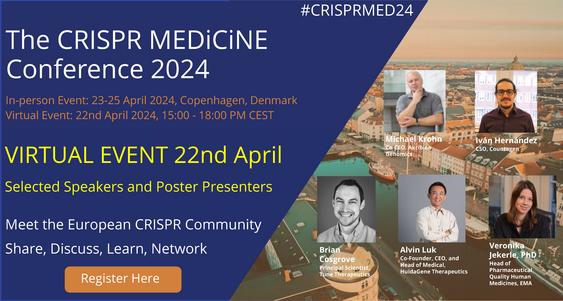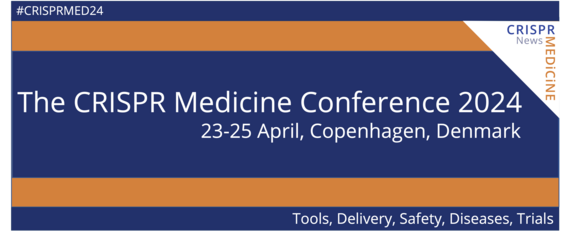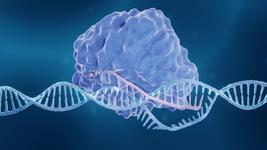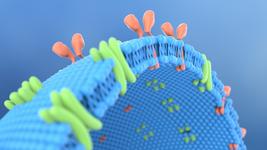CMN Weekly (6 August 2021)
Top picks
Research published in Cell Chemical Biology this week compared several chemical RNA modifications at different positions to identify synthetic crRNAs that improve RNA targeting efficiency and half-life in human cells. The work, led by Neville Sanjana at New York University and the New York Genome Center, found that co-delivery of modified crRNAs and recombinant Cas13 in ribonucleoprotein (RNP) complexes could alter gene expression in primary CD4+ and CD8+ T cells. We previously interviewed Neville Sanjana about his work in decoding the design rules for Cas13 gRNAs.
A Pivotal Moment for CRISPR in the Gene Editing Journey. This piece in BioSpace looks at the recent successes and state of play in the CRISPR therapy field.
From CRISPR to glowing proteins to optogenetics – scientists’ most powerful technologies have been borrowed from nature. In this piece for the conversation, chemistry professor Mark Zimmer at Connecticut College talks about cutting-edge techniques including CRISPR that were inspired by nature, and how they will changes the lives of everyday people.
mRNA's Next Chapter Has Nothing to Do With COVID-19 Vaccines. Informative writeup in Time about the vast potential of mRNA to deliver CRISPR gene-editing reagents to cells and tissues for therapeutic use.
Clinical news
- Fate Therapeutics announces treatment of first patient in landmark Phase 1 trial for FT819, the first-ever iPSC-derived CAR T-cell therapy. FT819 is being developed as an off-the-shelf CAR T therapy candidate with a novel CD19-specific 1XX CAR integrated into the TRAC (endogenous TCR receptor locus). In the trial, patients with advanced B-cell leukaemias and lymphomas will be treated with 3 dosing regimens of FT819. We described FT819 in more detail in a previous clinical update.
Industry
CRISPR Therapeutics will participate in the Canaccord Genuity 41st Annual Growth Conference (virtual) on Thursday 12th August, 2021. A live webcast as well as a replay of the event will be available on the company’s homepage during and after the conference. Find more details here.
- Intellia Therapeutics announces second quarter 2021 financial results and highlights recent company progress. The company exited quarter 2 with a strong cash position of $551.3 million. Company highlights include proof-of-concept for its in vivo CRISPR delivery platform with first-ever clinical data from in vivo administered CRISPR genome-editing candidate NTLA-2001 in humans. Read more about NTLA-2001 in our recent clinical trial update.
- New York-based bacterial therapeutics company Ancilia Biosciences has been awarded a National Science Foundation (NSF) grant to further develop its microbiome therapeutics platform. The funding will be used to advance Ancilia's proprietary platform that leverages the natural function of CRISPR to produce a new class of live biotherapeutics (LBPs) with engineered immunity to viral phages, which comprise approximately half of the gut microbiome. Data suggest that they contribute to disease and potentially limit the efficacy of LBPs.
- SeQure Dx, a gene-editing diagnostics company based in Massachusetts, emerges from stealth and announces $17.5M in Series A funding. The company's technology which is based on GUIDE-seq, ONE-seq and related assay technologies for detection of off-target gene-editing events addresses the emerging need for personalised diagnostics to assess the risk of gene-editing therapies.
Research
- Researchers at Duke University, US, have developed and characterised two conditional transgenic mouse lines for epigenome editing using dead Cas9 (dCas9). The new lines, Rosa26:LSL-dCas9-p300 and Rosa26:LSL-dCas9-KRAB, are suitable for gene activation and gene repression, respectively. By targeting the gRNAs to transcriptional start sites or distal enhancer elements, the researchers could show regulation of target genes and expected changes to epigenetic states and phenotypes in vivo and ex vivo. The findings were published in Nature Methods earlier this week.
- A team in the US published findings in Nature Methods yesterday describing how long-range CRISPR activation of distal transcriptional enhancers could be achieved by concurrent recruitment of artificial TFs to the enhancer and promoter of a target gene in human cells. The findings can potentially broaden the scope of the epigenetic editing toolbox.
- Researchers in China evaluated the therapeutic effect of using CRISPR-Cas9 to target HPV16 E7, a human papilloma virus subtype associated with cervical cancer. Comparing CRISPR-Cas9 to previously established ZFN and TALEN systems, the team observed comparable efficiency and specificity in inhibiting cell growth and colony formation and inducing apoptosis in cervical cancer/pre-cancer cell lines. They also report CRISPR-mediated inhibition of tumour formation in an in vivo xenograft formation assay for cervival cancer. The findings were published in Cancer Gene Therapy this week.
COVID-19
- Research led by Jennifer Doudna, David Savage and Patrick Hsu, all at the University of California Berkeley, has resulted in a new CRISPR-based assay for SARS-CoV-2 that can detect small amounts of viral RNA (~30 molecules per µl of RNA) in less than an hour. The new assay, called FIND-IT, uses Cas13 to detect the RNA and another Cas enzyme Csm6 to boost the fluorescent signal readout. The findings were published in Nature Chemical Biology yesterday.
Industry quarter 2 financial updates
It's the time of year where companies reveal their quarter 2 finanical status with general business and programme updates. You will find the highlights at the links below:
- Cellectis business update and first half-year results
- Allogene Therapeutics second quarter finanical results
- CRISPR Therapeutics business update and financial report
- Sangamo Therapeutics recent business highlights and financial report
- Editas second quarter results and business updates
- Fate Therapeutics second quarter financial results
Education and podcasts
- The CRISPR revolution. A free course for second-level science teachers hosted by EMBL’s European Learning Laboratory for the Life Sciences (ELLS) in collaboration with the Public Engagement team at EMBL-EBI in September 2021. More details and application link here.
- Professor Matthew Cobb, zoologist at the University of Manchester discusses the history of genetic engineering in the 3rd installment of a 3-part podcast series for BBC radio by examining the fears and hopes surrounding CRISPR gene editing. Listen to the podcast for free here.
Reviews
Vector Strategies to Actualize B Cell-Based Gene Therapies. This review discusses current B cell engineering efforts and strategies towards bringing modified B cells into the clinic, including in vivo viral delivery of editing reagents to B cells.
A deep insight into CRISPR/Cas9 application in CAR-T cell-based tumor immunotherapies. This recent review provides an overview on the CAR-T cell applications within tumour immunotherapy. Recent findings regarding the application of genome-editing technologies such as CRISPR-Cas for preparing universal CAR T-cells or cells that can counteract tumour escape are also discussed.
Tags
CLINICAL TRIALS
Sponsors:
National Institute of Allergy and Infectious Diseases (NIAID)








